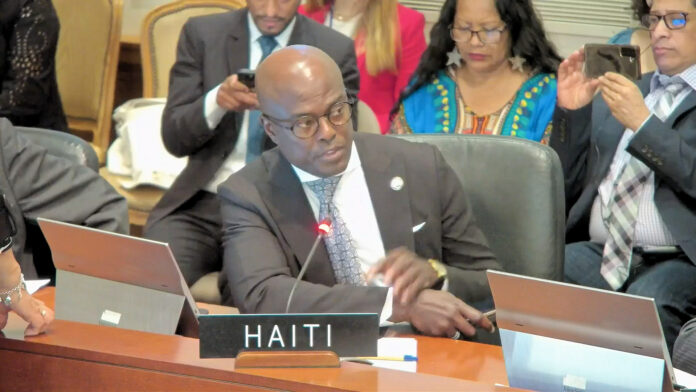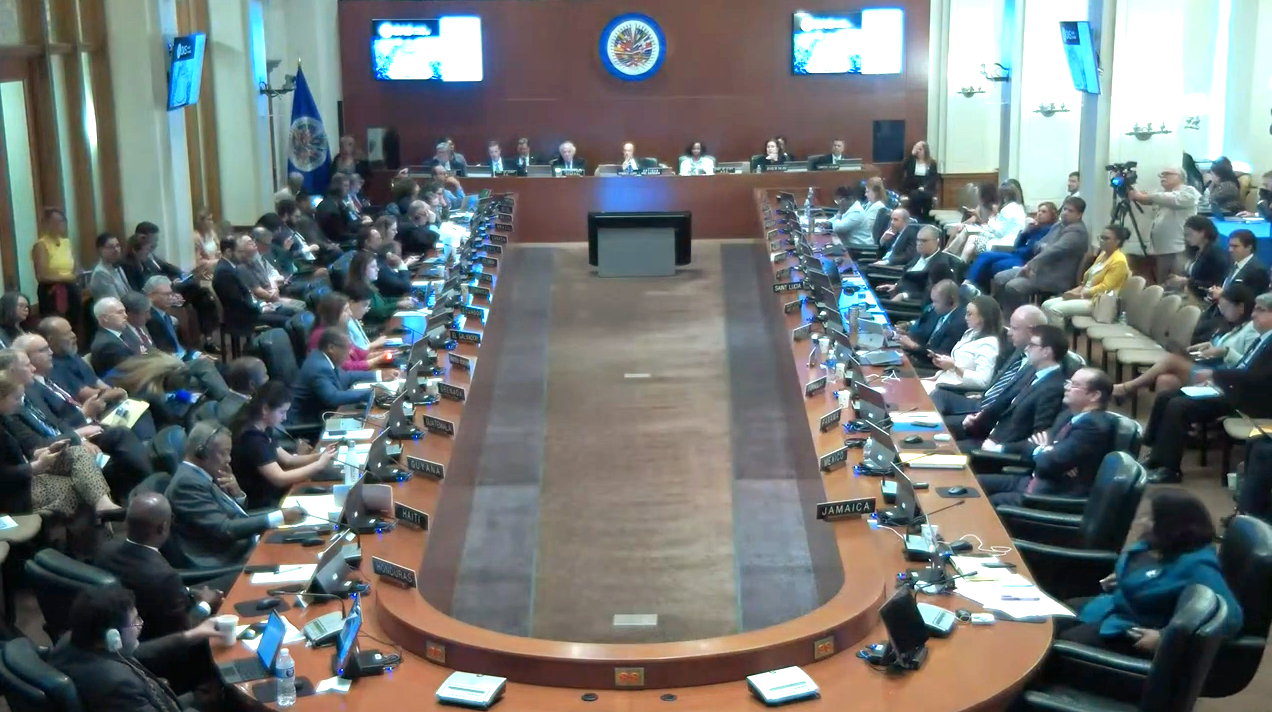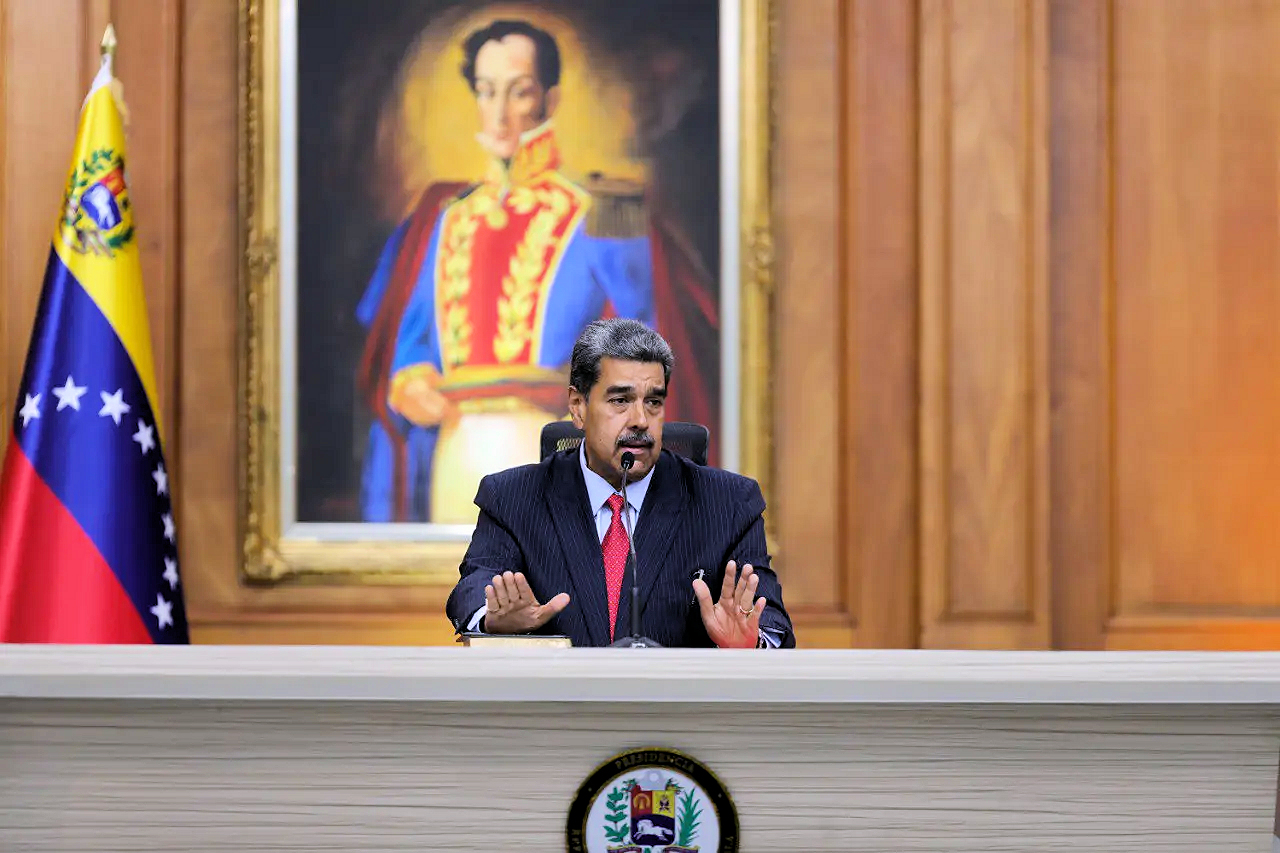
The Permanent Council of the Organization of American States (OAS) called a special meeting at its Washington, DC headquarters on Wed., Jul. 31, 2024 to discuss the Jul. 28 Venezuelan presidential election.
According to the latest counts issued by Venezuela’s National Electoral Council (CNE), President Nicolas Maduro won that contest with 51.95% (6.4 million votes) compared to 43.18% (5.3 million votes) for U.S.-backed opposition candidate Edmundo González.
Once again, Washington seeks to subvert Venezuela’s sovereign vote, as it previously and unsuccessfully sought in 2006, 2012, 2013, and 2018, in short, ever since the “Bolivarian Revolution” began with Hugo Chavez’s electoral victory in 1999.
The U.S. and European mainstream media have launched a withering barrage of reports and editorials charging that there was massive fraud, echoing the far-fetched claims of Venezuela’s far-right opposition, led by political activist María Corina Machado for whom González is a surrogate, that they won the election with 67% of the vote. U.S. Secretary of State Anthony Blinken embraced the fabrication, saying on Aug. 2 that González had received “the most votes,” although State Department spokesman Matthew Miller backtracked a bit on Aug. 5, saying that Washington had not yet recognized González as the president-elect.

On Aug. 6, the CNE submitted its electoral tallies for verification to Venezuela’s Supreme Court of Justice, which Maduro had asked to review the results. The tallying, announcement, and propagation of the results have been undermined by computer attacks of “unprecedented magnitude” – one crippling the CNE’s website and the other slowing the vote counting computers (which are not connected to the internet) – according to Orinoco Tribune.
The OAS convocation was to be expected, in collusion with Washington’s Latin American allies – principally Argentina’s President Javier Milei, Chile’s President Gabriel Boric, Peru’s coup-imposed President Dina Boluarte, and Guyana’s President Irfaan Ali.
A draft resolution was presented to the 28 nations assembled. Four nations – Dominica, Mexico, St. Vincent and the Grenadines, and Trinidad and Tobago – did not attend. The text began by “noting with concern widespread and insistent allegations of irregularities during the electoral process” and asked for the CNE to “publish immediately the presidential election voting results at the level of each polling station,” an impudent intrusion into a sovereign electoral process of a nation whose voting system has been widely judged to be excellent.
The resolution needed 18 votes to pass. Eleven nations abstained from the vote: Antigua and Barbuda, Bahamas, Barbados, Belize, Bolivia, Brazil, Colombia, Grenada, Honduras, St. Kitts and Nevis, and St. Lucia.
That left only 17 to vote in favor: Argentina, Canada, Chile, Costa Rica, Dominican Republic, Ecuador, El Salvador, Guatemala, Guyana, Jamaica, Panama, Paraguay, Peru, Suriname, United States, Uruguay… and Haiti. Thus the resolution failed.
Haiti’s slap across Venezuela’s face is particularly ironic. From 2008 to 2018, Venezuela provided Haiti with about 44 million barrels of discounted petroleum products for a total value of $4.24 billion. What’s more, Venezuela allowed Haiti to channel 40% of those petroleum revenues into a specially-loaned PetroCaribe development fund – to build schools, hospitals, roads, parks, and infrastructure – repayable after 25 years at only 1% interest.
On top of that, over those years, Venezuela built and upgraded airports, power plants, roads, and other infrastructure for Haiti. After the 2010 earthquake, it gave $1.3 billion in aid and cancelled $395 million of PetroCaribe debt.
That’s why, when President Jovenel Moïse first betrayed Venezuela in 2019 by not recognizing Maduro as president, it sparked universal outrage and stoked his opposition’s demonstrations.
Even more ironically, many of the politicians and political parties in Haiti’s current government were among those who criticized Moïse. Now they are doing the exact same thing: bowing to Washington.

“There is nothing surprising in Haiti’s betrayal [of Venezuela] through its [Transitional] Presidential Council, this rump Executive composed of parties and organizations revealing their true face, notably Fanmi Lavalas, Pitit Desalin and the Montana group,” writes Berthony Dupont in Haïti Liberté’s editorial this week. “They have clearly unmasked themselves… Their servility and allegiance to imperialism has discredited them. The Haitian people have lost all confidence in them.”
“Haiti’s colonial administration did not dare to welcome and recognize the electoral victory and re-election of President Nicolas Maduro because it is banking on Venezuela’s destabilization by voting against him at the OAS,” Dupont continues. “How far will this corrupt Presidential Council, with its combined left and right wings, go in such scandalous conduct, not acting in the name of the Haitian people but rather for the retrograde, reactionary oligarchy and their corrupt allies in the traditional political class?”
“The Haitian people, for their part, have reaffirmed their firm, complete, and unwavering solidarity with the Venezuelan leaders and the democratic advances, along with social and economic reforms, carried out by the Bolivarian and Chavista Revolution for the benefit of the poorest,” Dupont concludes. “Haiti and Venezuela have a common struggle, and one common enemy: imperialism!”










